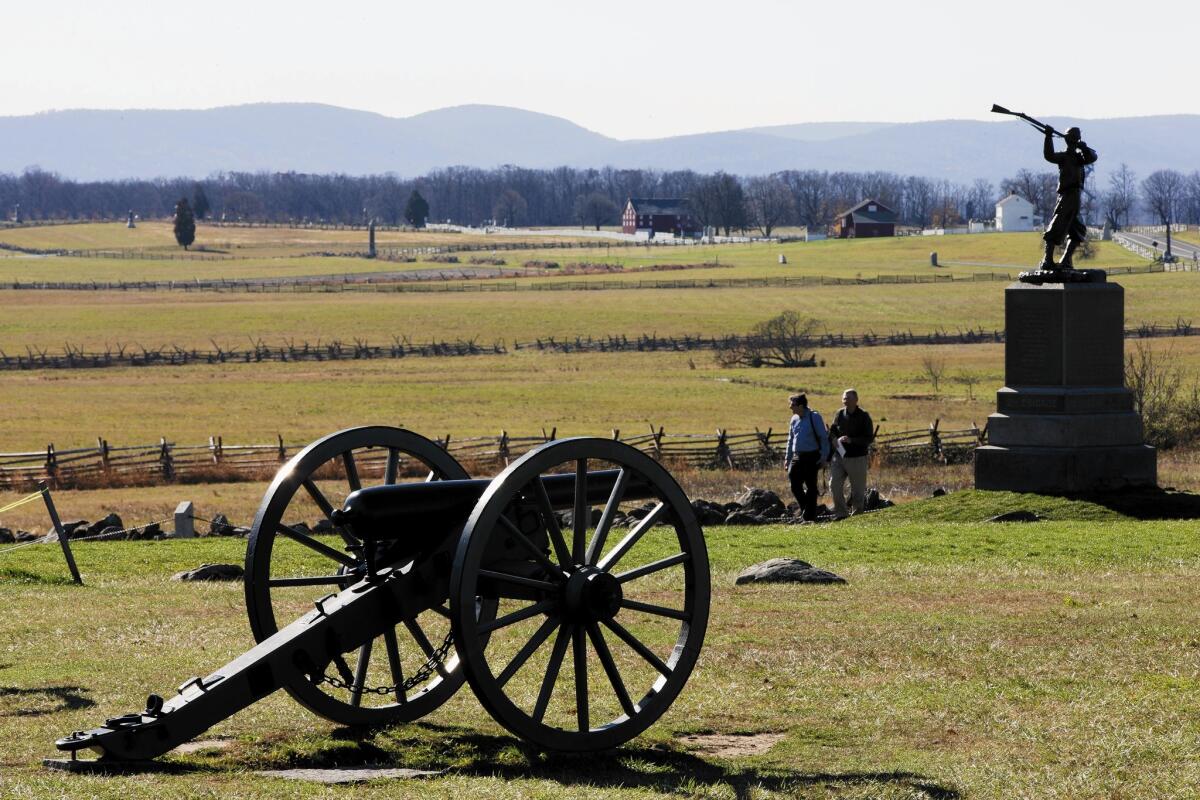Civil War hero on track to receive Medal of Honor

- Share via
WASHINGTON — Lt. Alonzo H. Cushing is poised to receive the Medal of Honor a bit late: 150 years after his heroics at Gettysburg.
Buried deep in a thick defense bill to fund modern-day weapons systems and military operations in Afghanistan is a measure to waive the time limit for posthumously awarding the nation’s highest military honor to Cushing. The 22-year-old Union artillery officer refused to leave the battlefield even after being severely wounded during Pickett’s charge July 3, 1863. He died there after being shot in the head.
“It’s never too late to do the right thing,” said Rep. Ron Kind (D-Wis.), who cosponsored the legislation.
If President Obama agrees, and the legislation’s sponsors expect he will, Cushing will have waited the longest — of 3,461 recipients — to receive the Medal of Honor.
The legislation, which cleared Congress late Thursday night, highlights what — and how long — it can take to advance a cause on Capitol Hill.
In Cushing’s case, the effort began more than 25 years ago with a letter to the late Sen. William Proxmire (D-Wis.) from a constituent, now 93, who lives on land once owned by the Cushing family.
“After all these years, it’s about time,” the constituent, Margaret Zerwekh, said by phone from Delafield, Wis.
After Proxmire retired, his successors and other Wisconsin lawmakers picked up Cushing’s cause.
Dave Krueger, a Delafield resident who also championed Cushing, credited Zerwekh’s perseverance. “I think it was just letter after letter after letter,” he said.
A Facebook page, “Give Alonzo Cushing the Medal of Honor,” also sprang up.
Phil Shapiro, a 30-year-old history buff and Iraq war veteran who started the Facebook page, said he had heard people say, “Why are our politicians wasting their time on this?”
His response: “It is important for us as a society to do right by those who have sacrificed for our country, regardless of when they served.”
Cushing’s command — Battery A, 4th U.S. Artillery — was at the focal point of the Confederate attack on the last day of the three-day battle that became a turning point in the Civil War.
Cushing, in command of 110 men and six cannons positioned on Cemetery Ridge, was wounded in the shoulder and groin during the Confederate attack. His men were decimated, but he remained at his post.
“The guy is standing there holding his intestines in with one hand commanding the battery,” said Frank Siltman, director of Museums and Military History at Ft. Sill, Okla. “Even by modern standards, this is an act of incredible heroism.”
Cushing’s heroics haven’t been entirely forgotten. A stone marker recognizing his deeds has been on the battlefield since 1887.
Cushing was close to receiving the medal last year, but House-Senate negotiators dropped the provision from the final bill.
Defense Secretary Chuck Hagel still would have to recommend him for the medal, and Obama would have to approve. But Cushing’s admirers note that in 2010, Army Secretary John M. McHugh expressed support for honoring him.
That sentiment isn’t universal, however. Scott Hartwig, a historian at Gettysburg National Military Park, said that although Cushing “certainly performed deeds that were deserving” of a Medal of Honor, awarding him one after 150 years would be “problematic.”
If Cushing receives one, why not others who performed heroics that day but never received recognition, Hartwig asked. “It solves one oversight and highlights many more that are left untouched.”
Recommendations for the Medal of Honor must be formally made within two or three years of the action, depending on the military branch, unless Congress waives the time limits. In January 2001, President Clinton awarded the Medal of Honor to African American Civil War hero Andrew Jackson Smith at a White House ceremony attended by Smith’s 93-year-old daughter.
Still to be decided is where Cushing’s medal would go. Multiple places claim him as their own.
“We would be so honored for it to come to Alonzo’s birthplace — Delafield, Wis.,” Krueger said. The town 25 miles west of Milwaukee already has a monument to Cushing and two of his brothers, who also distinguished themselves in battle.
Others have suggested it go to Fredonia, N.Y., about 45 miles southwest of Buffalo, where Cushing grew up.
Still others have suggested it go to West Point, from which Cushing graduated. He is buried there beneath a headstone inscribed, “Faithful unto death.”
More to Read
Sign up for Essential California
The most important California stories and recommendations in your inbox every morning.
You may occasionally receive promotional content from the Los Angeles Times.











